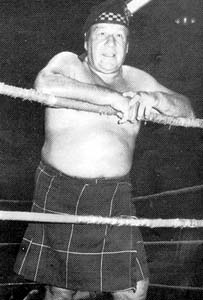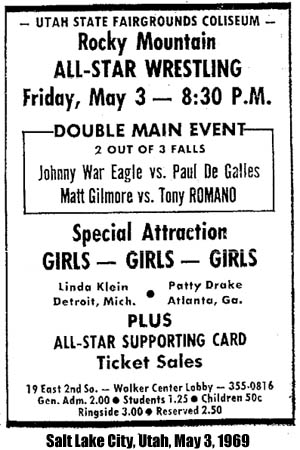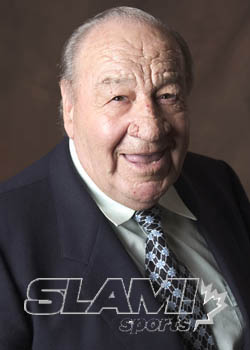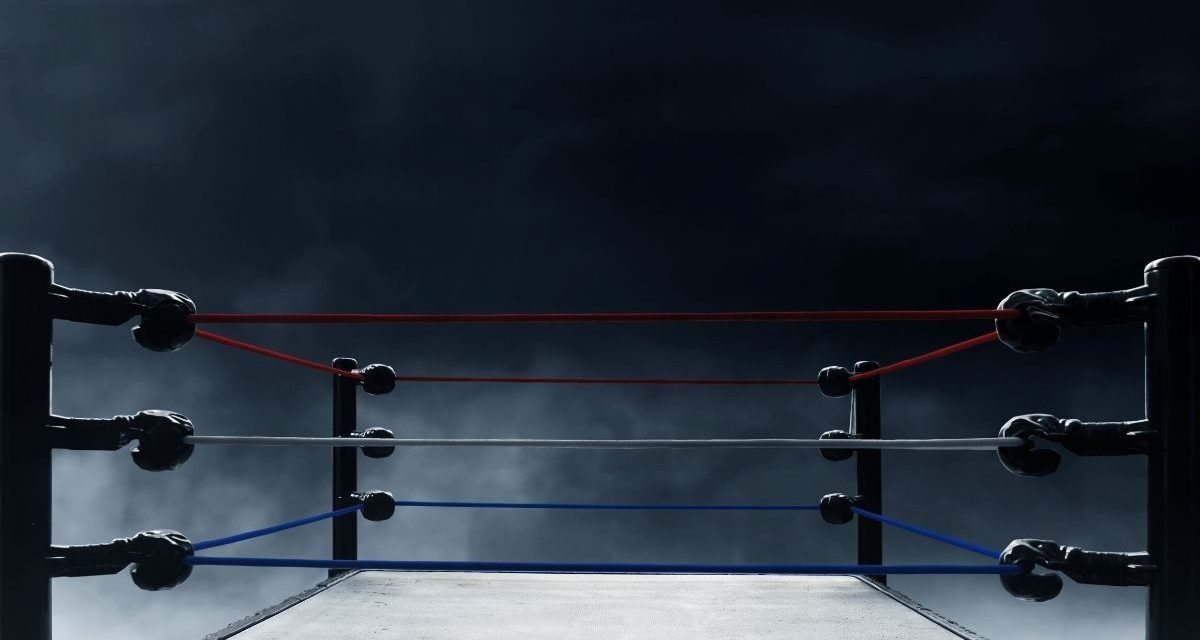Matt Gilmour, who died Monday morning, is one of those wrestlers who traveled the globe, perhaps never headlining on a regular basis, but always putting on a good show, whether under some variation of his real name, as Duncan McTavish, or, perhaps under a mask as a Hangman or one of the El Santos.
And he was always happy to share a tale from anywhere he’d been.
Here’s one from Madison Square Gardens in Phoenix, Arizona:
“My mind was a little bit where it shouldn’t have been, and I walked through the door and two goddamned Mexicans threw a quart of beer over me. I chased them. Madison Square Gardens had a balcony, and I got right up on the balcony, and I threw one over the balcony, and the other guy was so scared he jumped over.”

Duncan McTavish
Or a trip to Hawaii where he hooked up with King Curtis Iaukea, on the way back from wrestling in Japan:
“He said, ‘I’m going to take you out for the afternoon.’ That was so I could tell him what I thought of his quarterhorses! But you know what, I remembered that afternoon because he reached up into an avocado tree and he cut down an avocado that was as big as a grapefruit, split it in half, and pulled the pit out of it. He gave it to his wife and said, ‘Fill that with tuna salad.’ Then he went over into the plantation and got a couple of pineapples. Him and I sat and ate. That was one of the better afternoons I really enjoyed. We didn’t talk business, well, we talked horses. Just relaxed.”
In San Francisco, he didn’t quite fit in with the marijuana crowd:
The promoter, Roy Shire, asked Gilmour how long he was going to stay in town.
“Not too long.”
“Why not?”
“Nobody’s making very good money.”
“What do you mean?’
“Well, they’re all smoking the same cigarette.”
A natural storyteller, Gilmour loved to get together with the other veterans of the mat wars, whether it was in Hamilton for biweekly lunches or the biannual Titans in Toronto dinners. He was in the loop as well on so many abroad, keeping in touch with notable recluses such as Hans Schmidt. Working with his kids, he’d host a pig roast north of Toronto that featured a wide variety of characters and friends.
One of those he hooked up with again after years apart was Northern Ontario promoter Al Campbell, worked with Gilmour in the Montreal Grand Prix office in the 1970s.
“We had a great time together. We used to joke, when we were going to a show after a day at the office, we’d take each other’s hand and skip down the hallway, singing, ‘Hi ho, hi ho, it’s off to work we go.’ Guys would see us at the office, and say, ‘Have you guys had a few too many, or are you just glad to get out of here?'” laughed Campbell. “We never took ourselves seriously.”
That is perhaps Gilmour’s greatest legacy. He was easy-going and fun to be around.
Born in Old Cumnock, Ayrshire, Scotland, in April 3, 1932, to a father who was a bus driver, and a mother who had worked in munitions, McTavish toiled in a coal mine as a teen. The family had relatives in Canada and decided to make the move. The Gilmours settled in Hamilton, Ontario, and McTavish played competitive soccer and worked at LifeSavers candy company. He then enlisted in Princess Patricia’s Canadian Light Infantry, and served in the Korean War. He was shot a couple of times, and some of the memories still haunt him.
When his five-year stint in the army ended, he was at loose ends. Deciding to capitalize on his boxing skills, McTavish went to Wentworth’s gym in Hamilton, run by former wrestler Jack Wentworth (Jack Hodgson). It was a regular hangout for area pro wrestlers like Jack Hill (later Jerry Valiant, Guy ‘Stomper’ Mitchell, etc.), George Momberg (a.k.a. Killer Karl Krupp) and Lloyd Morris. Wentworth gave him a break, and soon Gilmour was off to Detroit to start his career.
In Northern Ontario and Quebec, he really learned his craft. He was under a mask with fellow Hamiltonian Vic Rossitani as the Hangmen, complete with a hangman’s noose hanging on the side of the ring.
“As the Hangmen, they had a lot of heat, but of course, you wouldn’t know who they were. They covered themselves well,” recalled “Big” John Quinn, one of those who graduated from the Hamilton “Factory” and later knew Gilmour well in British Columbia.
The noose was a dangerous gimmick, though, as Quinn found out.
“He almost killed me, him and Rossitani. They hung me in the corner,” said Quinn. “They pulled the thing up on me in the corner, and it tightened up, and I was unconscious.” On the way to the dressing room, groggy and trying to get up, a referee told him, “Stay there, it looks good.”
“When I got in the dressing room, I stood up and looked in the mirror. Holy shit! My whole neck looked like a raw hamburger,” recalled Quinn.
In North Bay, he schooled newcomer “Cowboy” Bob Kelly.
“Matt just took a liking to me for some reason, I guess, maybe, because I tried so hard and he could see it,” said Kelly. Gilmour, still under a mask, would ask the promoter to book him with Kelly in the opener, with Kelly then refeering the rest of the matches and Gilmour working the main event in a tag bout. “It was all Matt’s idea. He would talk to me. He just taught me a lot about dying and selling in the ring.”
From there, Kelly got booked through Terry Garvin and Ronnie Garvin in the Gulf Coast territory, based out of Mobile, Alabama, where he became a star. “Matt, a lot of the stuff that he taught me, I brought it down with me here and used it. He helped me a lot. Green as I was, and not knowing anybody, just had the heart to do it, I guess you would call it. I guess Matt saw that in me, and he helped me.”
Though they never crossed paths again, the Internet brought them in touch again, and they talked on the phone a few times. Kelly would always send him a program from the Cauliflower Alley Club reunion every year.

Gilmour then hit the road to Utah, Arizona and California. “I hit every territory there was in the States, the good ones and the bad ones. It wasn’t because I couldn’t work, it was because I could work,” he said.
Arriving in Vancouver for All-Star Wrestling, co-owner Sandor Kovacs dubbed him Duncan McTavish, and he was a de facto deputy to boss Gene Kiniski.
It was in B.C. that Gilmour really found a home, and got into the horse business big time. He had a farm where he bred, raised and trained racehorses. “I’ve always been around horses. I have an affinity for them,” McTavish (Matt Gilmour) explained to SLAM! Wrestling in a 2006 interview [Horsing around with Duncan McTavish ]. “It was the horses that kept me sane, because my day was filled with animals and racing. It was exciting … [The promotion] got a lot of ink because I’d be racing horses that would be winning races. Then I’d rush over to the arena and wrestle, then rush back to Hastings Park. I was always on the move.” Steven Little Bear was a partner in a few of the horses as well.
CFL lineman turned pro wrestler Mike Webster was one of those who benefited from Gilmour’s big-hearted nature.
“He was so giving of his time and his knowledge, which impressed me. So many guys in the business, they’re very territorial, they’re very guarded, very secretive. Duncan was always open and generous and always willing to help. He was so appreciated by the fans,” said Webster.
One of those fans was Jessie McCall [See the CBC video on her here].
“To wrestling fans in Vancouver at that time, Jessie was an absolute fixture. She would be there at ringside and before the matches, and between the matches, she was knitting. No one ever thought to ask her what she was knitting. Then I, being the dastardly villain that I was, I, from the ring one night, started to taunt her about her knitting — and was she knitting me something?” said Webster. “She was knitting these Cowichan sweaters constantly. I was taunting her. I used to bug her and tell her that she wished I was her son. This would get her pissed off and she’d wave her cane at me and whatever. Now I starting taunting her about the sweater. It was for Duncan. She knit a new sweater for Duncan every year, and gave him a new Cowichan sweater.”
Besides working with just about everyone in B.C., McTavish recalled his championship pairing with Don Leo Jonathan fondly.
“That’s got to be the end all that him and I were tag team partners. You talk about Mutt and Jeff,” laughed Gilmour. “When we working for the tag team championship out in B.C., he got thrown out of the ring. I ended up pinning whomever it was. I come out, and you know Don Leo was pretty tall and gangly. So he’s getting up off the floor and some little Italian jumped up and kissed him on the mouth. I said, ‘Come on Leo, you and I are sweethearts, let’s go home.’ I never forgot that — the look on Don Leo’s face when the guy kissed him. These are the kind of memories that you keep.”
Webster said the PNE Gardens in Vancouver rocked when McTavish was there. “When the matches were being held there, and Duncan was on the card, everybody in the business was either Scottish or wanted to be Scottish. It was this kind of effect that he had on people.”
Angelo Mosca recalled Gilmour’s razor-sharp advice as helping him make more money. “He’s the guy that taught me how to use the blade,” said “King Kong” Mosca. “He was the one that I learned how to use the blade from, and I never looked back from the blade.”
The market for raising horses was in Ontario not B.C., though, so Gilmour moved back. Though he main evented against The Sheik at Maple Leaf Gardens, eventually he was happy just to work the smaller Ontario arenas for Dave “Bearman” McKigney.
A young Ricky Johnson, brother to Rocky Johnson, used to go with Gilmour to those Bearman shows.
“I didn’t really know a whole lot then,” said Johnson. “I wasn’t with my brother then. Dunc was telling me where to stay, where to eat, what to say, what not to say. ‘Go in the dressing room and keep your mouth shut and your eyes and ears open.'”
Gilmour was in Halifax when he made the decision to give it up. “Some punk” asked him why an old man like him was in the ring, so he chased him and dragged him down some stairs. “I’m thinking, ‘What’s an old man like me doing up on the ropes trying to dropkick some young kid,'” said Gilmour. “I didn’t want to push it too much longer, and my body was in fairly good shape, other than my heart.”
Besides the wrestling, Gilmour invested in income properties — advice he’d gotten from Gorgeous George. “When you get to a main event, just pretend you were on the opener, and use that money to put down on a triplex,” Gilmour recalled “The Human Orchid” telling him. “And I did, and I ended up owning two of them. That was my retirement plan, because they paid for themselves.”

Matt Gilmour. Photo by Andrea Kellaway
He also promoted country and western shows; “I’m really interested in Canadian talent. I promote a group called Gerry and the Coasters, they’re from down east. One of the girls I used to promote, Kelly Vaughan, she’s now in Las Vegas. I want to help them. I don’t want to make any money off them.”
For the last decade, he has fought countless health issues. He had a stroke on May 28, and was hospitalized, with doctors saying he would not come out of the Barrie, Ontario, hospital.
“Money has never been a driving fact for me,” Gilmour concluded, reflecting on his 29 years in the wrestling business and his 80 years on Earth. “Happiness is more important to me. And being with my family is more important than anything else.”
“He will always be remembered for his love of life and sense of humor,” wrote his son, Sean, in an email announcing his father’s death.
Gilmour passed away peacefully on June 5, 2011 at the Royal Victoria Hospital in Barrie, Ontario. He is survived by his sons Sean (Georgia) and Mark (Terri), and daughter Kathie, and his brothers Jean and Richard, as well as many grandchildren and great-grandchildren, nieces, nephews, cousins and extended family and countless friends.
A celebration of Matt Gilmour’s life will be announced at a later date. In lieu of flowers, the family is requesting a donation to the Royal Victoria Hospital Palliative care unit, or to simply give flowers to a loved one.
RELATED LINKS
- Sep. 18, 2007: Dinner/dance kicks off Hamilton Wall of Fame
- March 8, 2006: Horsing around with Duncan McTavish
Rest in peace, Dunc. Thanks for the memories over the years, and for putting me over. Greg Oliver can be emailed at goliver845@gmail.com.

